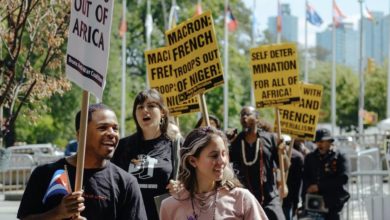Over a month after the March 29 presidential election, the Zimbabwe Electoral Commission has released the final vote counts.
|
The ZANU-PF and the MDC have been locked in an acute power struggle over the elections. According to Zimbabwe’s electoral law, a candidate must get 50 percent plus one vote in order to win outright; short of that, a runoff must take place between the top two candidates.
Mugabe’s ZANU-PF represents the government bureaucracy, the majority of veterans from Zimbabwe’s liberation war, and many rural residents who back Zimbabwe’s land reform process and are generally supportive of Mugabe’s anti-imperialist stance.
The MDC, on the other hand, represents the union of the white farmers and former apartheid forces together with some union leaders and activists. Backed to the hilt by Washington and London, the MDC has offered a South African-style arrangement with little land reform and an imperialist-endorsed economic development model. It would largely maintain the authority and prestige of the former settler elite and would return Zimbabwe to the British Commonwealth
These two divergent political perspectives have led to turmoil in the country during the post-election period. The ZANU-PF government, while not socialist, has embarked on a road of capitalist development that runs against imperialist dictates, expropriating land and businesses from the former settler elite and shunning the West in favor of increased “South-South” cooperation between Zimbabwe and large developing nations such as India and China.
In the period leading up the election, the imperialists intensified their nearly decade-long offensive against Zimbabwe, continuing to isolate it financially and encouraging economic sabotage to increase economic hardship. Skyrocketing inflation, unemployment, and shortages of goods helped the MDC pick up a number of supporters who hoped for some immediate relief.
The facts make a mockery of those decrying the election as fake and claiming that the ZANU-PF attempted to steal it. They fail to see—or turn a blind eye to—the economic hardship promoted by the West and the domestic “opposition” seeking to corral the vote, a far cry from a commitment to self-determination or “free and fair” elections.
The road ahead
In the post-election period, the mobilization of forces by both parties resulted in a number of clashes. The MDC-led opposition claims that as many as 10 of their supporters have been killed. The government has been under increasing pressure to solve the electoral crisis, even proposing a government of national unity to prepare the way for new elections.
Now that the results have been released, the MDC is saying they may not contest the runoff, which would likely lead to Mugabe retaining power. However, they will wait for the runoff date to be announced before making a decision.
The specter of intervention continues to lurk in the shadows, as both the African Union and United Nations are discussing options for the “international community” to take some part in Zimbabwe’s continued electoral process. The chance of violence could increase in the event a runoff is not contested and the MDC tries to use extralegal tactics to gain the presidency, or if foreign powers intervene to remove Mugabe by force.
The ZANU-PF is far from an impeccable institution. It is a capitalist party with some progressive elements, many of them war veterans. Nonetheless, the Western campaign against Zimbabwe is motivated by the ZANU-PF’s challenge to imperialism. Washington and its allies have done everything possible to destabilize the country in a bid to force regime change.
The MDC is the agent of that regime change, backed by the imperialists and the white settlers who want to return Zimbabwe to the neoliberal fold. The power struggle between those forces has not been one where the people of Zimbabwe can freely determine their future, but one muddied by foreign intervention.
Progressives must reject the oversimplifications promoted by the mainstream media and the majority of the “left,” who reduce matters to “Mugabe vs. the People.” Imperialism is the main culprit behind Zimbabwe’s economic woes, and Mugabe, too, has millions of people behind him. The struggle for the country’s destiny should proceed without outside interference. Hands off Zimbabwe!






